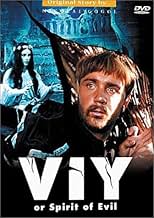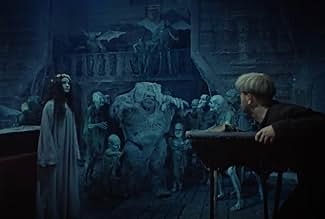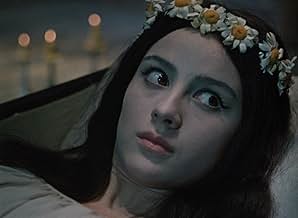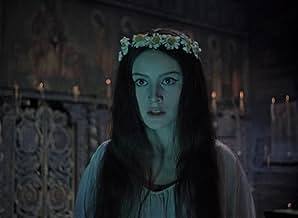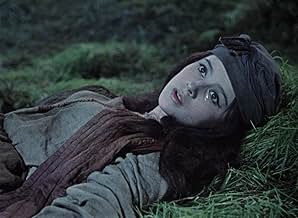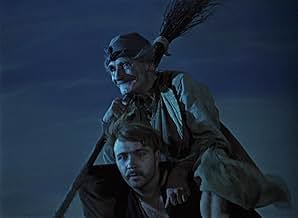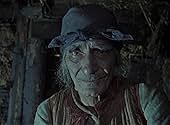Viy
- 1967
- Tous publics
- 1h 17m
IMDb RATING
7.2/10
11K
YOUR RATING
A young priest is ordered to preside over the wake of witch in a small old wooden church of a remote village. This means spending three nights alone with the corpse with only his faith to pr... Read allA young priest is ordered to preside over the wake of witch in a small old wooden church of a remote village. This means spending three nights alone with the corpse with only his faith to protect him.A young priest is ordered to preside over the wake of witch in a small old wooden church of a remote village. This means spending three nights alone with the corpse with only his faith to protect him.
Natalya Varley
- Pannochka
- (as N. Varley)
Aleksey Glazyrin
- Sotnik
- (as A. Glazyrin)
Nikolay Kutuzov
- Witch
- (as N. Kutuzov)
Vadim Zakharchenko
- Khalyava
- (as V. Zakharchenko)
Pyotr Vesklyarov
- Prncipal of the Seminary
- (as P. Vesklyarov)
- …
Vladimir Salnikov
- Gorobets
- (as V. Salnikov)
Dmitriy Kapka
- Overko
- (as D. Kapka)
Stepan Shkurat
- Yavtukh
- (as S. Shkurat)
Georgiy Sochevko
- Stepan
- (as G. Sochevko)
Nikolay Yakovchenko
- Spirid
- (as N. Yakovchenko)
Nikolay Panasev
- Comforter
- (as N. Panasev)
Borislav Brondukov
- Seminarian
- (uncredited)
Aleksandra Denisova
- Peasant
- (uncredited)
Lyubov Kalyuzhnaya
- Peasant
- (uncredited)
Viktor Kolpakov
- Peasant
- (uncredited)
Mikhail Kramar
- Seminarian
- (uncredited)
Margarita Krinitsyna
- Gafiyka
- (uncredited)
Featured reviews
"Vij" is a masterpiece of Russian cinema and a masterpiece of 60s horror. Having said that, it is perhaps a film that may not appeal to the gorehound variety of horror fan. Not only does it not possess any gore, but it plays for much of its length like a bucolic Russian fairy tale. The scary scenes when they come are in the last 20 minutes or so.
What makes "Vij" so wonderful are the lovingly shot scenes of rural Russia. The faces of all the peasants are shown in frequent close-up: ruddy, jovial, deeply lined with characterful wrinkles, blue-gray eyes twinkling. The camera is used to great effect in close-ups, blurry shots, spinning around our hero, zooming in and out, and those loving shots of farm houses and livestock. It often has a dream-like character and certain supernatural scenes are extremely surreal and effective. The blend of lighthearted comedy and echoes of folklore and a near-religiosity at times is also extremely effective. The lead does an excellent job as Khoma and his cohort of minders are equally good. Our deceased witch is a picture of beauty and reminds one of Snow White, such is her rosy-cheeked, fairytale beauty.
I could go on and on about what makes this film so wonderful. I'll suffice to comment on one more feature. The music by Karen Khatchaturian (nephew of the great Aram Khatchaturian, he of the "Sabre Dance" and the "Onedin Line" theme music) is very effective and draws on the sounds of several other Russian greats. One reviewer here mentioned both Prokofiev and Rachmaninov. I thought the exact same thing in the same scenes. There is an overall Prokofevian sound to the music and the choral numbers bring to mind Rachmaninov's "All-Night Vigil", most likely intentionally. The music in the demon scenes draws on Mussorgsky's "Nite on Bald Mountain" with its eerie string scratchings, again most likely intentionally. These are wonderful and evocative sources for Khatchaturian to draw from.
In summation, this is a cinematic masterpiece and is a must for fans of Russian cinema or classic cinema in general. Horror fans who can enjoy say, "Nosferatu", "The Cabinet of Dr Caligari", "Black Sunday", "Carnival of Souls" or other early greats, will no doubt want to seek this out. "Vij" is one of the early greats of the genre which it also transcends.
What makes "Vij" so wonderful are the lovingly shot scenes of rural Russia. The faces of all the peasants are shown in frequent close-up: ruddy, jovial, deeply lined with characterful wrinkles, blue-gray eyes twinkling. The camera is used to great effect in close-ups, blurry shots, spinning around our hero, zooming in and out, and those loving shots of farm houses and livestock. It often has a dream-like character and certain supernatural scenes are extremely surreal and effective. The blend of lighthearted comedy and echoes of folklore and a near-religiosity at times is also extremely effective. The lead does an excellent job as Khoma and his cohort of minders are equally good. Our deceased witch is a picture of beauty and reminds one of Snow White, such is her rosy-cheeked, fairytale beauty.
I could go on and on about what makes this film so wonderful. I'll suffice to comment on one more feature. The music by Karen Khatchaturian (nephew of the great Aram Khatchaturian, he of the "Sabre Dance" and the "Onedin Line" theme music) is very effective and draws on the sounds of several other Russian greats. One reviewer here mentioned both Prokofiev and Rachmaninov. I thought the exact same thing in the same scenes. There is an overall Prokofevian sound to the music and the choral numbers bring to mind Rachmaninov's "All-Night Vigil", most likely intentionally. The music in the demon scenes draws on Mussorgsky's "Nite on Bald Mountain" with its eerie string scratchings, again most likely intentionally. These are wonderful and evocative sources for Khatchaturian to draw from.
In summation, this is a cinematic masterpiece and is a must for fans of Russian cinema or classic cinema in general. Horror fans who can enjoy say, "Nosferatu", "The Cabinet of Dr Caligari", "Black Sunday", "Carnival of Souls" or other early greats, will no doubt want to seek this out. "Vij" is one of the early greats of the genre which it also transcends.
Viy is based on the same story, written by Nikolai Gogol, that inspired Mario Bava's masterpiece, Black Sunday. While the films have some similarities; for example, a witch and a fairytale atmosphere; the two really aren't much alike. Black Sunday went more for the straight horror, and was a better film for it. Viy is more of a religious themed film, and the witch plot line offers more in the way of the faith of the lead character than actual horror. The film has a massive amount of cult value, mostly due to the fact that it's not much like any other movie in terms of its style. The music and atmosphere combine to give it an other-worldly feel, and this helps massively where the plot is concerned. The basis of the film follows a man of God who must spend three days and three nights presiding over the corpse of a young girl, who also happens to be the local witch. Being dead isn't much of a hindrance to the witch, as she bombards our hero with black magic. With only his faith to protect him; will he be able to last three nights with her corpse?
The first half of the movie is really rather dull, as not a lot happens and it seems to mostly be a set-up for the latter section. The plot does pick up as the film goes on; but the film is never massively engaging, and that is its main downfall. However, the cinematography is great; and Viy has a very vibrant feel throughout. Black Sunday had a similar vibrant feel; and this film gives the viewer an idea of what Bava's film might have looked like in colour. The scenes that take place inside the church are the movie's main strongpoint, thus making it a shame that there aren't more of them. These scenes look great and brilliantly offset the gentle tone of the rest of the film. The climax delivers the best part of the movie, and the special effects there, while obviously cheap, look stunning and brilliantly suit the style of the film. Russia isn't very well known for its film industry, and this was one of the first horror films produced in the Soviet Union. Modern flick Night Watch has given the Russian film industry a new lease of life recently; and this film, like most other classics, is set for a remake. Oh well...I recommend Viy mainly to fans of art-house cinema.
The first half of the movie is really rather dull, as not a lot happens and it seems to mostly be a set-up for the latter section. The plot does pick up as the film goes on; but the film is never massively engaging, and that is its main downfall. However, the cinematography is great; and Viy has a very vibrant feel throughout. Black Sunday had a similar vibrant feel; and this film gives the viewer an idea of what Bava's film might have looked like in colour. The scenes that take place inside the church are the movie's main strongpoint, thus making it a shame that there aren't more of them. These scenes look great and brilliantly offset the gentle tone of the rest of the film. The climax delivers the best part of the movie, and the special effects there, while obviously cheap, look stunning and brilliantly suit the style of the film. Russia isn't very well known for its film industry, and this was one of the first horror films produced in the Soviet Union. Modern flick Night Watch has given the Russian film industry a new lease of life recently; and this film, like most other classics, is set for a remake. Oh well...I recommend Viy mainly to fans of art-house cinema.
Since I missed the showings other posters have mentioned, it took awhile for me to catch up with this on DVD. Nine and a half out of ten; a really wonderful horror fantasy. I would add only that the young preists harrowing experience
might well have inspired the Western horror novel and film "The Exorsist." I like this one, however, much better. This film is funny, scary, and visualy impressive. A real gem.
might well have inspired the Western horror novel and film "The Exorsist." I like this one, however, much better. This film is funny, scary, and visualy impressive. A real gem.
Viy is perhaps too short and has a slow start but when you stick with it it is really an excellent film that is very Russian in flavour and does its fantasy and horror elements in a most effective way. The scenery is both sumptuous and foreboding, so good in fact that you wish you were there. The film is lovingly shot and the special effects are certainly above-average with Aleksandr Ptushko's(also director of some of the best Russian fantasy films seen by me) style all over them. Another outstanding element is the music, it sets the atmosphere of the film brilliantly, at times lyrical and others surreal. Some have remarked about the influence of composers like Mussorgsky, Prokoviev and Rachmaninov and it's definitely there, the scoring of the creepy and surreal moments in particular have a very Mussorgsky-like wonderful weirdness. The dialogue is witty and thought-provoking, the Tolstoy and Poe comparisons remarked in a previous review are apt as well. The story engages throughout, the fantasy gives a real sense of wonder, the sense of adventure is exciting at least and the horror elements are appropriately creepy and unsettling. The characters are ones you have seen before but they really help to carry the film, fit in the atmosphere very well, have personality and all serve a point in some way to the story. All the characters are enthusiastically performed, sometimes with a tendency to be a tad over-theatrical but this is not uncommon for Russian/Soviet fantasy and especially from the 60s and it doesn't hurt things in any shape or form. To conclude, Viy is excellent and well worth watching if not quite a personal favourite. 8/10 Bethany Cox
I'm not particularly a fan of horror flicks. I watched this movie simply because I wanted to see something Russian. But as I found out, this is much more than a typical horror flick. It has a lyrical quality to it almost like a Greek play. True, it has ghosts & goblins & creepy things in it. But so do Greek plays.
I consider this to be a fantasy or an allegory with some nice subtle insights about rustic life and the human condition in general. Some of the witty dialogue is absolutely priceless. I'm not familiar with the writings of Gogol who wrote the original story of "Viy", but if you're a fan of Tolstoy's short stories ("The Imp and the Crust") or Guy de Maupassant ("The Devil") or maybe the lighter side of Poe ("Never Bet the Devil Your Head"), then this'll be right up your alley.
And of course it'll scare the socks off your arse.
The camera illusions in this movie are absolutely 1st class. Don't be put off by the fact that it had a "low budget" by Hollywood standards. The minimalist approach really brought out the director's creativity in this case. Like an old 1940s Jean Cocteau film, the special effects are timeless in their simplicity, and they will hold up for the next 50 years, long after CGI has gone the way of the dodo (and not a moment too soon).
I consider this to be a fantasy or an allegory with some nice subtle insights about rustic life and the human condition in general. Some of the witty dialogue is absolutely priceless. I'm not familiar with the writings of Gogol who wrote the original story of "Viy", but if you're a fan of Tolstoy's short stories ("The Imp and the Crust") or Guy de Maupassant ("The Devil") or maybe the lighter side of Poe ("Never Bet the Devil Your Head"), then this'll be right up your alley.
And of course it'll scare the socks off your arse.
The camera illusions in this movie are absolutely 1st class. Don't be put off by the fact that it had a "low budget" by Hollywood standards. The minimalist approach really brought out the director's creativity in this case. Like an old 1940s Jean Cocteau film, the special effects are timeless in their simplicity, and they will hold up for the next 50 years, long after CGI has gone the way of the dodo (and not a moment too soon).
Did you know
- TriviaNikolay Stepanov who plays the demon Viy, was a circus artist. He was cast for his strength, because costume of the creature was extremely heavy.
- GoofsWhile stopping at the inn for food and vodka (on the way to Sotnik's village) the horses are taken off the carriage, fed and watered too, but in between the shots of the horses, firstly, being watered and then fed, we still see them attached to the carriage between shots.
- ConnectionsFeatured in Woodlands Dark and Days Bewitched: A History of Folk Horror (2021)
- SoundtracksNight on Bald Mountain
Composed by Modest Mussorgsky
- How long is Viy?Powered by Alexa
Details
Contribute to this page
Suggest an edit or add missing content



